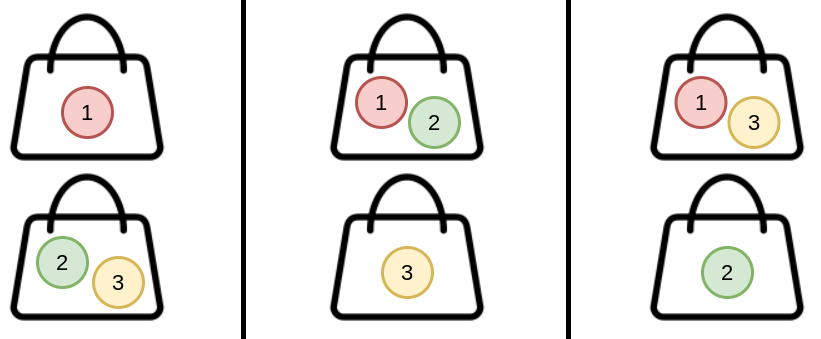| comments | difficulty | edit_url | tags | |
|---|---|---|---|---|
true |
Hard |
|
There are n unique candies (labeled 1 through n) and k bags. You are asked to distribute all the candies into the bags such that every bag has at least one candy.
There can be multiple ways to distribute the candies. Two ways are considered different if the candies in one bag in the first way are not all in the same bag in the second way. The order of the bags and the order of the candies within each bag do not matter.
For example, (1), (2,3) and (2), (1,3) are considered different because candies 2 and 3 in the bag (2,3) in the first way are not in the same bag in the second way (they are split between the bags (2) and (1,3)). However, (1), (2,3) and (3,2), (1) are considered the same because the candies in each bag are all in the same bags in both ways.
Given two integers, n and k, return the number of different ways to distribute the candies. As the answer may be too large, return it modulo 109 + 7.
Example 1:
Input: n = 3, k = 2 Output: 3 Explanation: You can distribute 3 candies into 2 bags in 3 ways: (1), (2,3) (1,2), (3) (1,3), (2)
Example 2:
Input: n = 4, k = 2 Output: 7 Explanation: You can distribute 4 candies into 2 bags in 7 ways: (1), (2,3,4) (1,2), (3,4) (1,3), (2,4) (1,4), (2,3) (1,2,3), (4) (1,2,4), (3) (1,3,4), (2)
Example 3:
Input: n = 20, k = 5 Output: 206085257 Explanation: You can distribute 20 candies into 5 bags in 1881780996 ways. 1881780996 modulo 109 + 7 = 206085257.
Constraints:
1 <= k <= n <= 1000
We define
We consider how to distribute the
The final answer is
The time complexity is
class Solution:
def waysToDistribute(self, n: int, k: int) -> int:
mod = 10**9 + 7
f = [[0] * (k + 1) for _ in range(n + 1)]
f[0][0] = 1
for i in range(1, n + 1):
for j in range(1, k + 1):
f[i][j] = (f[i - 1][j] * j + f[i - 1][j - 1]) % mod
return f[n][k]class Solution {
public int waysToDistribute(int n, int k) {
final int mod = (int) 1e9 + 7;
int[][] f = new int[n + 1][k + 1];
f[0][0] = 1;
for (int i = 1; i <= n; i++) {
for (int j = 1; j <= k; j++) {
f[i][j] = (int) ((long) f[i - 1][j] * j % mod + f[i - 1][j - 1]) % mod;
}
}
return f[n][k];
}
}class Solution {
public:
int waysToDistribute(int n, int k) {
const int mod = 1e9 + 7;
int f[n + 1][k + 1];
memset(f, 0, sizeof(f));
f[0][0] = 1;
for (int i = 1; i <= n; ++i) {
for (int j = 1; j <= k; ++j) {
f[i][j] = (1LL * f[i - 1][j] * j + f[i - 1][j - 1]) % mod;
}
}
return f[n][k];
}
};func waysToDistribute(n int, k int) int {
f := make([][]int, n+1)
for i := range f {
f[i] = make([]int, k+1)
}
f[0][0] = 1
const mod = 1e9 + 7
for i := 1; i <= n; i++ {
for j := 1; j <= k; j++ {
f[i][j] = (f[i-1][j]*j + f[i-1][j-1]) % mod
}
}
return f[n][k]
}function waysToDistribute(n: number, k: number): number {
const mod = 10 ** 9 + 7;
const f: number[][] = Array.from({ length: n + 1 }, () =>
Array.from({ length: k + 1 }, () => 0),
);
f[0][0] = 1;
for (let i = 1; i <= n; ++i) {
for (let j = 1; j <= k; ++j) {
f[i][j] = (f[i - 1][j] * j + f[i - 1][j - 1]) % mod;
}
}
return f[n][k];
}